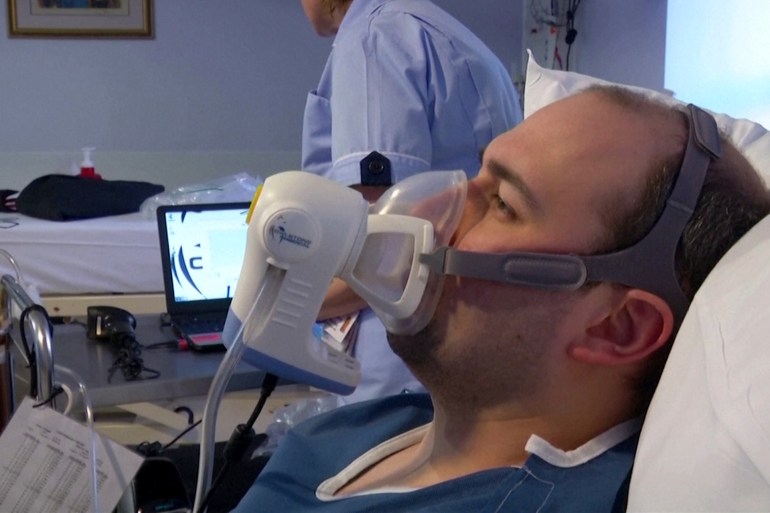TEHRAN -
On the first anniversary of the Iranian government's announcement of its intention to enrich uranium by 60%, a secret report of the International Atomic Energy Agency was leaked to Western media confirming Iran's use of part of its highly enriched uranium reserves to produce radioactive medicines.
On the other hand, Iranian media reported the authenticity of the report, stressing that Tehran had transferred quantities of enriched uranium stockpile with a purity of 60% to another material, to produce the molybdenum element used in the production of radioactive drugs.
In light of reports from the Swiss capital regarding the entry of the Vienna negotiations - aimed at reviving the nuclear agreement - to a critical stage, observers believe that Tehran has pre-empted the signing of the potential agreement with this step, to make it impossible to transfer its stock of highly enriched uranium outside the country.
persistent need
But another group of Iranians says that Tehran has previously clearly stated that the goal of enriching uranium by 60% is to meet the country's need for radioactive materials used in the treatment of cancer.
The former head of the Atomic Energy Organization of Iran, Ali Akbar Salehi, had stated - a year ago - that his country intends to convert 60% enriched uranium into molybdenum and radioactive drugs in the Tehran Research Reactor.
In this context, the former head of the Atomic Energy Development Center in Iran, Hossein Abneki, points out that more than one million citizens suffer from incurable diseases and are in urgent need of radioactive drugs, stressing that his country will not forget the Western sanctions in 2009 on radioactive drugs that nearly killed many patients.
Tehran announced that the purpose of its uranium enrichment is to meet the country's need for radioactive materials used in cancer treatment (Reuters)
The course of the Vienna negotiations
As for whether the Iranian move will negatively affect the course of the Vienna negotiations, political affairs researcher Siawush Falahpour believes that the move limits the possibility of using highly enriched uranium for military purposes, and thus will contribute to pushing the negotiations forward.
Falahpour - in his speech to Al Jazeera Net - considered converting 60% of enriched uranium into a necessary material in the production of radioactive drugs, but it indicates the peacefulness of the Iranian nuclear program, accusing Western countries of fabricating a file that cost the Iranian people dearly during the past two decades.
He accused the major world powers that possess atomic bombs of double standards in dealing with the Iranian and Israeli nuclear programs, stressing that his country adhered to the 2015 nuclear agreement even a year after the previous US administration withdrew from it, which proves its determination to reduce tension and dispel the concerns of the international community despite its urgent need. to harness atomic energy for medical purposes.
The Iranian researcher concluded that converting highly enriched uranium into a valuable material used in nuclear medicine sends a practical message that Tehran wants to use nuclear technology for peaceful purposes in addition to adapting it to advance its economy, which has long suffered from the repercussions of sanctions imposed on it for more than 4 decades.
According to the 2015 nuclear agreement, Iran is not entitled to keep more than 202 kilograms of uranium enriched to 3.67 percent, but it responded to former US President Donald Trump's withdrawal from the agreement by raising the rate of uranium enrichment to 5%, then to 20%, and in the third stage. to 60%.
According to reports from the Vienna negotiations, Tehran is scheduled to transfer its stockpile of enriched uranium above 3.67% purity outside the country.
Unfounded reports
For his part, a researcher at the Middle East Center for Strategic Studies, Abbas Aslani, revealed that the Iranian stockpile of highly enriched uranium is much larger than what is reported by some Western media, adding that converting parts of this stock into materials suitable for making small targets for exposure to radiation is part of Inventory reduction framework.
In an interview with Al Jazeera Net, Aslani questioned the validity of Western reports that his country had converted 2.1 kilograms of highly enriched uranium into 1.7 kilograms of a different substance enriched by 60%, and said that the country's need for molybdenum determined the amount transferred.
He added that "talking about Tehran's maneuvering to avoid transferring its stockpile of highly enriched uranium abroad is empty and baseless, because the Vienna negotiating parties have not yet agreed to revive the nuclear agreement."
Referring to the "European Troika" (France, Britain and Germany) calling on Iran not to convert highly enriched uranium into radioactive drugs, Aslani stressed that the radioactive materials used in nuclear medicine are not at all in danger of proliferation, and it is better for these countries to speed up the return of the United States to implement its commitments in nuclear deal.
The researcher at the Middle East Center for Strategic Studies concluded by saying that the country's need for radioactive drugs reaffirms the need to agree in the Vienna negotiations on how to secure the materials used in nuclear medicine.

